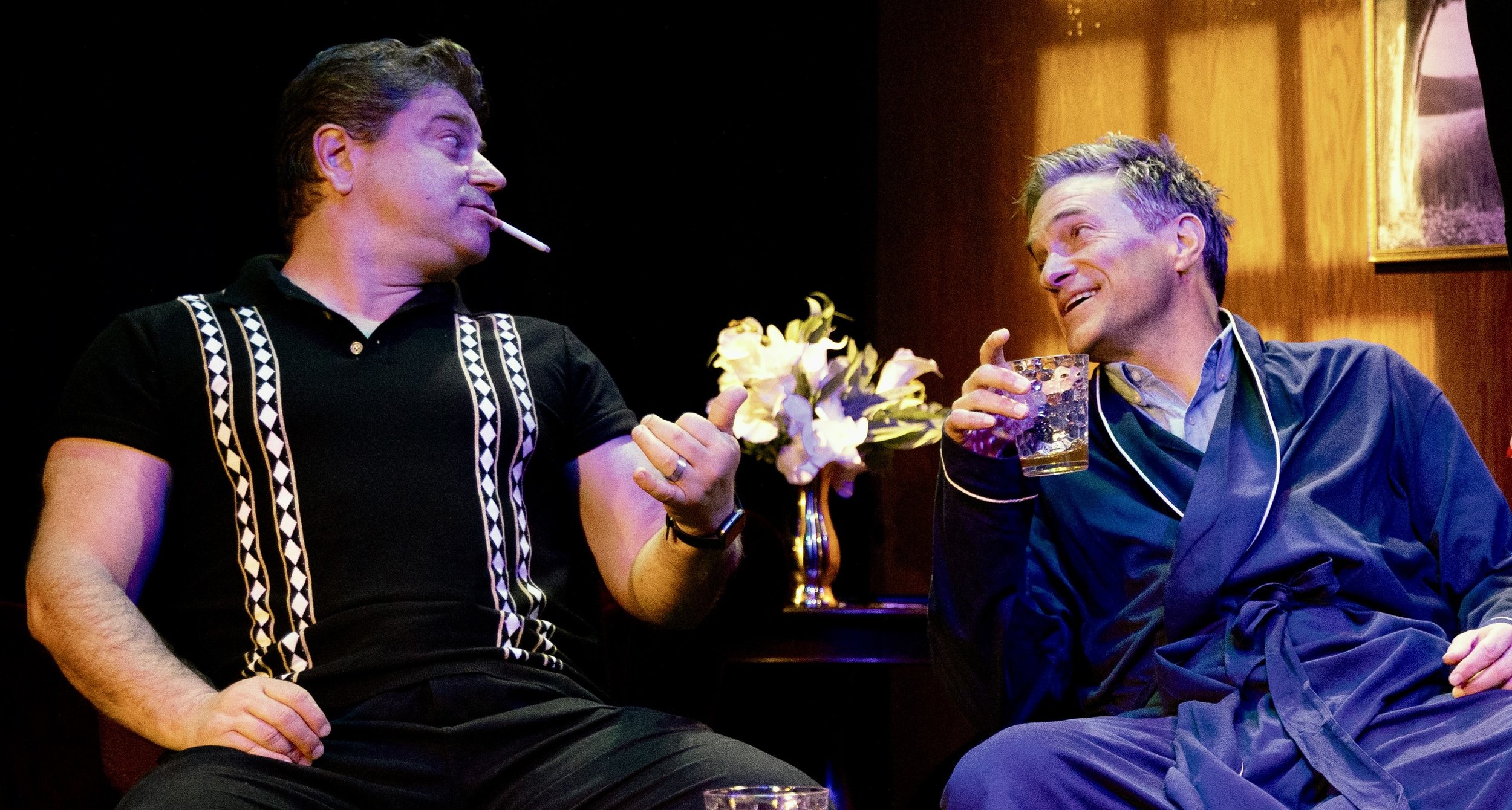Susan Cabot (Sean Young) gets a little too cozy with her dwarf-son-who-isn’t-a-dwarf (Josh Alscher).
It’s a noir. It’s a drama. It’s a comedy, maybe. It’s Ode to the Wasp Woman, Rider McDowell’s history of B-level stardom in long-ago Hollywood. Graced by Sean Young (Blade Runner, Wall Street), a Hollywood leading lady whose own career history is pretty colorful, Wasp Woman has its attractions, but coherence and insight aren’t among them.
An uninvited party guest (David Wenzel) with George Reeves (Douglas Everett Davis).
Specifically, McDowell looks into the short and unhappy lives of four relatively minor celebrities who toiled, mostly in B movies and early television, from the 1930s through the ’50s. Young embodies, rather splendidly, Susan Cabot, a leading lady in Roger Corman movies like The Wasp Woman and The Saga of the Viking Women and Their Voyage to the Waters of the Great Sea Serpent. But before McDowell gets to her, he looks in on Carl “Alfalfa” Switzer (Josh Alscher), beloved Our Gang member, now, in 1959, reduced to odd jobs such as dog training and appearing at shopping center openings. He’s rude, self-pitying, and potty-mouthed (sample dialogue: “F— off, I’m working here”), baselessly bragging that he and Spencer Tracy are best buds in the shortest of what essentially are four one-acts. It doesn’t tell you much, except that Alfalfa was a jerk who died in a stupid way.
“Young [possesses] a certain star quality and tears into a meaty role with abandon.”
On to Cabot, in the mid-’80s, trying desperately to get some publicity by consenting to an ill-starred interview with the Weekly World News. Her career never amounted to much: her life went south when her husband left her over the stress of raising their son Timmy (Alscher)—a dwarf stretched out through medication to 5-foot-4, but still short and still miserable, and not very bright besides. That Alscher is full-sized is confusing, and it’s hard to tell whether his flat-voiced, affectless performance is meant to convey some sort of mental deficit, or if he just isn’t trying very hard. But Young’s a dervish, and the mother and son alternately screaming at each other about nothing and making up, plus getting more physical than an average mother and son might, is a frightening glimpse of manic depression and passive-aggressiveness.
Toni Mannix (Rita Louise) visits Reeves, in a dream. Photographs by Maria Baranova.
Next up is George Reeves (Douglas Everett Davis), TV’s Superman, in a more substantial playlet that begins after his suicide and flashes back. A couple traipsing through his bloodied home are his Superman costar Jack Larsen (Alscher again) and Reeves’ former mistress, Toni Mannix (Rita Louise). That history takes a while to flesh out, and the friend she keeps calling “Jack” could be any Jack—McDowell should have inserted a couple of series-specific lines to clarify his identity. Of the unfortunate celebrities, Reeves is the closest thing to a decent guy; he’s kindly to a vagrant (Jonathan Hartman, impressive in several roles), and he voices some legitimate complaints: “I get this role, and for some reason, unlike all my other roles, the public thinks I’m really Superman and not just an actor playing Superman…. I’ve been up for dozens of jobs, but they can’t get past that.” But he’s an alcoholic and needlessly vicious to his fiancée Leonore (Anna Telfer), who’s no prize either. Not much here reveals who Reeves was, or why he’d shoot himself.
It’s a sad story, but not as sad as that of Barbara Payton (Payton Georgiana), a Universal Studios starlet who acted opposite James Cagney and Gregory Peck before frittering everything away, alienating Hollywood by talking to Confidential, becoming homeless, moving back in with her awful parents, and dying at 39. A cringey flashback has her dad (Hartman) dancing uncomfortably close with a teenage Barbara. Mom and Dad bicker here too, and their hectoring ill-treatment of Barbara may explain why she drinks too much and becomes a nymphomaniac.
Another party guest (Alscher) with Leonore (Anna Tefler).
Four underwhelming stars, four tragic fates. But why are we here? McDowell’s dialogue is sharp enough, if strewn with more profanity than the mid-century generated. But he also directed, slackly, with too many meaningless pauses and some interminable changes of Christian Fleming’s not very complicated set. More curiously, McDowell also has all four celebs sing—period songs that have little to do with the action, though at least Payton’s “Help Me Make It Through the Night” carries a little context. Pearl Gopalani’s costumes aren’t always period-accurate, but Maarten Cornelis’ moody, noirish lighting helps.
The period references—Toots Shor, Darla Hood, Lon Chaney Jr.—are fun, and the Reeves episode, at least, generates a little sympathy. And then there’s Young, who does possess a certain star quality and tears into a meaty role with abandon. But if you’re looking for insight into how privileged people destroy themselves, or why Hollywood attracted such extreme, messed-up personalities, you won’t find it in Ode to the Wasp Woman. Mostly, it’s just two hours of bad behavior.
Ode to the Wasp Woman runs at the Actors Temple Theatre (339 W. 47th St.) through Jan. 31, 2024. Evening performances are Tuesday, Wednesday and Thursday at 7:30 p.m.; matinees are Wednesday at 2 p.m. and Sunday at 5:30 p.m. For tickets, visit telecharge.com.
Written and directed by: Rider McDowell
Set: Christian Fleming
Lighting: Maarten Cornelis
Costumes: Pearl Gopalani (Ms. Young’s costumes by Montgomery Frazier)






